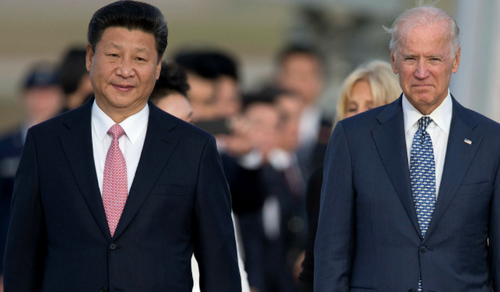U.S. Engagement With China Has “Come To An End”, Biden’s Asia Czar Says
President Biden, possibly most famous for his – and his son’s – business dealings in China coming into question whilst running for the Presidency, may wake up this week to find out from one of his top advisors that he’s now a China hawk.
That is, if you ask Kurt Campbell, the U.S. coordinator for Indo-Pacific affairs on the National Security Council.
Campbell said this week that the U.S. was “entering a period of intense competition with China as the government running the world’s second-biggest economy becomes ever more tightly controlled by President Xi Jinping,” according to Bloomberg.
Campbell, speaking at Stanford University, commented: “The period that was broadly described as engagement has come to an end. China will now operate under a new set of strategic parameters. The dominant paradigm is going to be competition.”
“China is determined to play a more assertive role,” he said. He said that President Xi has “almost completely disassembled nearly 40 years of mechanisms designed for collective leadership.”
He cited President Xi’s policies as reason for the “shift” in U.S. policy: China’s economic war with Australia, its military clashes near India and the rise of what he called “harsh power” or “hard power”.
China Foreign Ministry Spokesman Zhao Lijian said this week: “China-U.S. relations will naturally experience some competition, which is prevalent among other major-country relations, but it is wrong to define the relationship with competition because it will only lead to confrontation and conflict.”
The comments came at the same time that U.S. Trade Representative Katherine Tai and Chinese Vice Premier Liu He were speaking for the first time. Tai had noted prior to the discussion that the U.S. and China faced “very large challenges” in diplomacy.
Meanwhile, President Biden appears to finally be waking up to the idea that Covid may not have occurred, and/or made its way out of China, naturally, and asked the U.S. intelligence community to redouble its efforts in investigating the origin of the virus this week.
When Biden asked for an “evidence-based international investigation and to provide access to all relevant data and evidence,” China’s embassy in Washington called it a “smart campaign and blame shifting”.
Wang Yiwei, director of Renmin University’s Institute of International Affairs and a former Chinese diplomat, commented on the growing tensions: “The U.S. idea of engagement is one that has conditions and is about bringing China into its system, not only in economics but also in politics. The U.S. sees China overtaking its own economy, so it is looking to contain China and prevent it from moving up the value chain.”
Campbell concluded: “We believe that the best way to engage a more assertive China is to work with allies, partners and friends. The best China policy really is a good Asia policy.”
Meanwhile, we can’t help but wonder if the shift in attitudes will affect whatever Chinese Board designation Hunter Biden is working on achieving this week…
Tyler Durden
Thu, 05/27/2021 – 14:22
via ZeroHedge News https://ift.tt/34owo78 Tyler Durden
